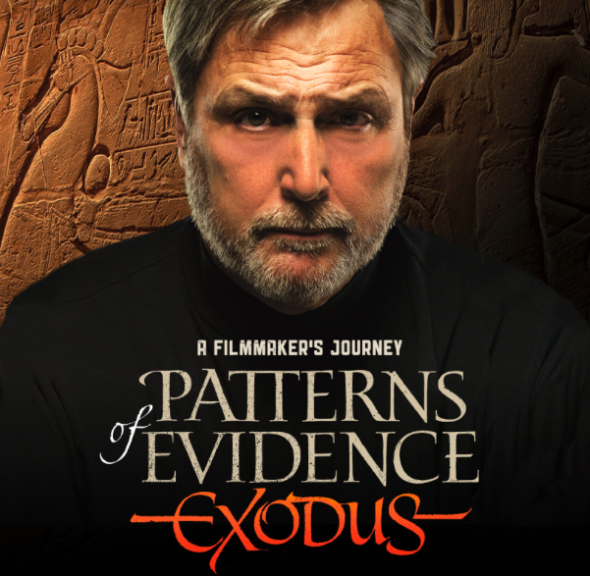Inspirations|January 02, 2015 10:17 EST
The Exodus Historically Documented Wrong? Expert Finds 'Patterns of Evidence' in New Film That Will Shock The World [INTERVIEW]

With the release of Ridley Scott's controversial Film 'Exodus: God's and Kings' BREATHEcast caught up with exodus expert Timothy Mahoney to discuss his new film 'Patterns of Evidence: Exodus' and the validity of the account in the Bible.
Mahoney is set to release his documentary, 'Patterns of Evidence: Exodus' on Jan 19th and it chronicles an in-depth archaeological investigation in Egypt with the goal of confirming the biblical text of the events that are chronicled. See below what Mahoney had to say about his findings and how it differs from the history so popularly taught.
BREATHEcast: In your documentary you talk about the realities, myths, and newly discovered facts of the Exodus. Can you briefly share with us your findings on those 3 bullet points?
Timothy Mahoney: Reality - Today very few Egyptologists or archaeologists will risk their careers looking for an event such as the Exodus out of Egypt. They believe that the early stories of the Bible have been proven to lack any credible evidence and no historical basis. But my research has pointed to the likely cause for the lack of evidence being because most are searching for the Exodus in the wrong time period.
Myth - That what is known about all of Egypt's history is set and final. Another myth, of course, is that the Exodus must have happened during the reign of Ramses.
Discovered - By using a scientific approach we looked for evidence matching the six major steps of the Exodus story - and the search included all periods of ancient Egypt, not just the traditionally held times. When this was done, a pattern of evidence for all six events was found in the correct sequence in Egypt and Canaan.
BC: Your research shows that if the chronology was shifted then there is in fact proof of the Exodus. Tell us about that and how would that have affected our knowledge and portrayal today of the Exodus?
TM: What the film demonstrates is that the Arrival, Multiplication, Slavery, Judgment, Exodus and Conquest events of the Bible can be seen in Egypt's history. But this evidence is at a different time period then when scholars have assumed it should be. So what's wrong? That's what you will have to see when the film comes out for a single night on Monday, January 19 at 7pm local time in select cinemas nationwide. The evening will begin with a pre-show program at 6:30 that will describe some of the journey and background behind the film. After the film there will be a panel discussion hosted by Gretchen Carlson with experts discussing the significance of the material seen in the film and what it means today.
Is it common for history to be off by that many years (400)?
TM: One of the questions the film asks is: how sure are we that certain events happened exactly when we think they happened? There are several histories that 'Patterns of Evidence: The Exodus' examines. One is the Bible's timeline. Raising the first question, "Did the Exodus happen around 1250 BC or 1450 BC?" The other timeline the film examines is Egypt's. Does a pattern of evidence matching the events of Exodus happen in Egypt's New Kingdom, at the time of Ramesses, where so many Egyptologist have suggested it should reside? The reality is that there is not good archaeological evidence for the Exodus at that time. That's why many people say it didn't happen. Then there is this pattern of evidence earlier in time - during the Middle Kingdom. So what is the explanation for that?
The film explores the relationship between the histories of Egypt and the Bible. And, yes, the film demonstrates that between these histories there are fairly strong reasons why some type of correction could be made.
In your film there are points where Egyptian history does align with the Bible. The Brooklyn papyrus even shows names of Israeli slaves. Why is it so hard for skeptics to consider that as proof?
TM: The main reason the connection isn't made is because this document is considered to be too old to have anything to do with the Israelites of the Bible. Often, evidence like the Brooklyn Papryrus is seen as a fragment of information. They would suggest that these fragments of Egyptian data are interesting and, yes, there were Semitic people serving as slaves in Egypt but that in no way represents any real connection to the Exodus. Most scholars have never seen that these "fragments" when put together actually form a very powerful pattern.
Other scholars will argue that these fragments were used to create the myth of a great event with a contest between God and Pharaoh in what became the Exodus narrative. These stories eventually were gathered and recorded in the Bible to give the people of Israel a history.
This type of thinking has been proposed by Israel Finkelstein, an Israeli archaeologist to explain how the Bible and stories like the Exodus came to be written. He lays out this theory in his book, The Bible Unearthed.
I went to Israel to speak with Finkelstein and asked him "Why would they invent such a history of being slaves?" He replied, "I don't think they invented history." He said he didn't think they completely invented the biblical account; they just picked up the stories and legends around them and added in some new myths to convey what they wanted to tell the people.
What Israel Finkelstein was explaining to me was his theory as to how the Bible was written based on the fact that there has been no evidence for a Ramesses Exodus or Conquest in the 13th century BC.
But the real question that I explored over a 12-year investigation is: If there was no evidence of an Exodus during the time of Ramesses, then was there evidence anytime in Egypt's history that looked like an Exodus event? The Bible makes a claim that Moses was the author of the first five books. And he was recording many events as an eyewitness.
Do you find that Christians and Jews agree with your research and the fact that there is proof of the Exodus but the time line is just off?
TM: Not everyone, but the answer is yes, there is a growing number of people who I respect that are taking a second look at what is being presented in the film 'Patterns of Evidence: The Exodus'. These include Bible scholars, archaeologists, and even Egyptologists in Israel, Europe and America - Jewish and Christian.
Check out Part 1 of our interview with Mahoney in which he weighs in on the controversy surrounding Ridley Scott's, 'Exodus: God's and Kings'. 'Patterns of Evidence: Exodus', will be presented in 600 select U.S. cinemas by Fathom Events and Thinking Man Films on January 19, click HERE for more information.












